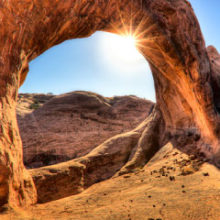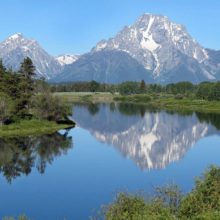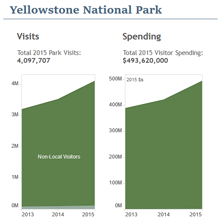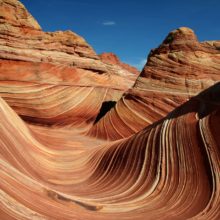More than 100 economists and academics in related fields from across the country sent a letter (PDF) to President Obama urging him to “create jobs and support businesses by investing in our public lands infrastructure and establishing new protected areas such as parks, wilderness, and monuments.”
The letter states federal protected public lands are essential to the West’s economic future, attracting innovative companies and workers, and contributing a vital component of the region’s competitive advantage. Among the signatories are three Nobel laureates.
Letter, News Release, Related Research, and Annotated Bibliography
- Letter to the President (PDF) and Signers (text below)
- News Release
- Summary of Analysis on Economic Impact of Protected Lands
- Annotated Bibliography of Related Peer-Reviewed Research
- Short Video Interview (below) with Ray Rasker, of Headwaters Economics
President Barack Obama
The White House
1600 Pennsylvania Avenue, NW
Washington, D.C. 20500
Dear Mr. President,
As economists and academics in related fields, we believe that federal protected public lands are essential to the West’s economic future. These public lands, including national parks, wilderness areas and national monuments, attract innovative companies and workers, and are an essential component of the region’s competitive advantage.
The West’s public lands contribute to our economic well being in a variety of ways, including resource extraction and recreation. These activities can and must coexist with expanding protections for America’s world-class natural amenities.
The U.S. is now predominantly a service-based economy, and the fastest-growing regions are those that have been able to attract talented workers, entrepreneurs, and investors across all sectors of the economy. In the West especially, public lands play a pivotal role in attracting and retaining people and businesses. This is the case for all sectors, including manufacturing.
The rivers, lakes, canyons, and mountains found on public lands serve as a unique and compelling backdrop that has helped to transform the western economy from a dependence on resource extractive industries to growth from in-migration, tourism, and modern economy sectors such as finance, engineering, software development, insurance, and health care.
Today, one of the competitive strengths of the West is the unique combination of wide-open spaces, scenic vistas and recreational opportunities alongside vibrant, growing communities that are connected to larger markets via the Internet, highways and commercial air service.
Increasingly, entrepreneurs are basing their business location decisions on the quality of life in an area. Businesses are recruiting talented employees by promoting access to beautiful, nearby public lands. This is happening in western cities and rural areas alike.
Together with investment in education and access to markets, studies have repeatedly shown that protected public lands are significant contributors to economic growth.
America’s public lands can be used responsibly while expanding protections for the nation’s world- class natural amenities. We urge you to create jobs and support businesses by investing in our public lands infrastructure and establishing new protected areas such as parks, wilderness, and monuments.
Sincerely,
The following individuals have endorsed the contents of this letter. Institutional references are provided for identification only.
Kenneth J. Arrow, Stanford University (Emeritus), Nobel Laureate, California
Robert M. Solow, Massachusetts Institute of Technology (Emeritus), Nobel Laureate, Massachusetts
Joseph Stiglitz, Columbia University, Nobel Laureate, New York
HJ Albers, Oregon State University, Oregon
Donna M. Anderson, University of Wisconsin – La Crosse, Wisconsin
Paul Baer, Georgia Institute of Technology, Georgia
Richard Barrett, University of Montana, Montana House of Representatives, Montana
Mimi Larsen Becker, University of New Hampshire, New Hampshire
Frank Benford, Economist, Oregon
Robert P. Berrens, University of New Mexico, New Mexico
William B. Beyers, University of Washington (Emeritus), Washington
Douglas Booth, Marquette University (retired), Wisconsin
Gardner Brown, University of Washington (Emeritus), Washington
Greg Brown, Central Washington University, Washington
Arthur J. Caplan, Utah State University, Utah
David Carrier, Appalachian Regional Commission, District of Columbia
Ken Casavant, Washington State University, Washington
Karen Conway, University of New Hampshire, New Hampshire
Douglas Dalenberg, University of Montana, Montana
Ray Dezzani, University of Idaho, Idaho
Ernest Diedrich, Saint John’s University, Minnesota
Christopher A. Erickson, New Mexico State University, New Mexico
Jon Erickson, University of Vermont, Vermont
Frank L. Farmer, University of Arkansas, Arkansas
Yeganeh H. Farzin, University of California — Davis, California
Paul Ferraro, Georgia State University, Georgia
Nicholas E. Flores, University of Colorado — Boulder, Colorado
Nancy Folbre, University of Massachusetts — Amherst, Massachusetts
David Gallo, California State University — Chico (Emeritus), California
Heidi Garrett-Peltier, University of Massachusetts — Amherst, Massachusetts
Eban Goodstein, Bard Center for Environmental Policy, New York
Neva Goodwin, Tufts University, Massachusetts
Hannah Gosnell, Oregon State University, Oregon
Kyle Gracey, Global Footprint Network, California
Philip Graves, University of Colorado — Boulder, Colorado
Daphne Greenwood, University of Colorado — Colorado Springs, Colorado
Michelle Haefele, Economist, Colorado
Dan Hagen, Western Washington University, Washington
Robin Hahnel, Portland State University, Oregon
Darwin C. Hall, California State University — Long Beach (Emeritus), California
Walt Hecox, Colorado College State of the Rockies Project, Colorado
Steve Henson, Western Washington University, Washington
Taylor Hesselgrave, Economics for Equity and the Environment Network, Oregon
Richard B. Howarth, Dartmouth College, New Hampshire
Ray G. Huffaker, University of Florida, Florida
Nan Jenks-Jay, Middlebury College, Vermont
Harley Johansen, University of Idaho, Idaho
Jerry D. Johnson, Montana State University, Montana
Desmond Jolly, University of California — Davis (Emeritus), California
Sudiksha Joshi, West Virginia University, West Virginia
Frederic B. Jennings Jr., Center for Ecological Economic and Ethical Education, Massachusetts
Jonathan Isham, Jr., Middlebury College, Vermont
Christopher Juniper, CORE, Colorado
Maureen Kilkenny, Economist, Nevada
Chris McGrory Klyza, Middlebury College, Vermont
Richard L. Knight, Colorado State University, Colorado
John A. Laitner, Economic and Human Dimensions Research Associates, Arizona
Megan Lawson, Economist, Montana
David Lewis, University of Puget Sound, Washington
Peter M. Lichtenstein, Boise State University (Emeritus), Idaho
John Loomis, Colorado State University, Colorado
Paul Lorah, University of St. Thomas, Minnesota
Christine Loucks, Boise State University, Idaho
David Marcouiller, University of Wisconsin — Madison, Wisconsin
Wade E. Martin, California State University — Long Beach, California
Mark McBeth, Idaho State University, Idaho
Deirdre N. McCloskey, University of Illinois at Chicago, Illinois
Don McLeod, University of Wyoming, Wyoming
Pete Morton, Economist, Colorado
Brian Murray, Duke University, North Carolina
Don Negri, Willamette University, Oregon
Julie Nelson, University of Massachusetts — Boston, Massachusetts
Peter Nelson, Middlebury College, Vermont
Noelwah Netusil, Reed College, Oregon
Ernie Niemi, Economist, Oregon
Roger Noll, Stanford University (Emeritus), California
Richard B. Norgaard, University of California — Berkeley, California
Mark Partridge, Ohio State University, Ohio
Nate Peach, George Fox University, Oregon
James Pittman, Prescott College, Arizona
Thomas Michael Power, University of Montana, Montana
Ray Rasker, Headwaters Economics, Montana
Robert B. Richardson, Michigan State University, Michigan
Dan Rickman, Oklahoma State University, Oklahoma
Alexander Rist, Economist, King County Department on Natural Resources and Parks, Seattle, Washington
Gundars Rudzitis, University of Idaho, Idaho
Peter Schaeffer, West Virginia University, West Virginia
Douglass Shaw, Texas A&M University, Texas
Kristen Sheeran, Economics for Equity and the Environment Network, Oregon
Nathan Sivers-Boyce, Willamette University, Oregon
Kenneth A. Small, University of California — Irvine, California
Rob Southwick, Southwick Associates, Inc., Florida
Tesa Stegner, Idaho State University, Idaho
David Theobald, Colorado State University, Colorado
George Tolley, University of Chicago (Emeritus), Illinois
Austin Troy, University of Vermont, Vermont
John Tschirhart, University of Wyoming, Wyoming
William Ward, Clemson University, South Carolina
John C. Whitehead, Appalachian State University, North Carolina
John Willoughby, American University, District of Columbia
Randall K. Wilson, Gettysburg College, Pennsylvania
Maggie Winslow, Presidio Graduate School, California
Michael W. “Mick” Womersley, Unity College, Maine
Richard O. Zerbe, University of Washington, Washington
Cc:
Speaker of the House of Representatives John Boehner
Senate Majority Leader Harry Reid
U.S. Interior Department Secretary Ken Salazar
U.S. Department of Agriculture Secretary Tom Vilsack
This short video features an interview with Dr. Ray Rasker (Executive Director of Headwaters Economics) discussing the letter sent to President Obama:



